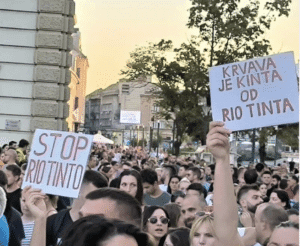In a referendum, Serbian voters approved the constitutional changes that the government said were part of a reform process. Nearly 60% of people who cast ballots on January 16 voted in favour of the amendments that focus on the election of judges and prosecutors, while nearly 40% were against. A simple majority of those who turned up was necessary to determine the outcome, and therefore the constitutional changes will be put in effect.
The turnout was just over 30% of Serbia’s 6.5 million eligible voters. Reasons for the low turnout were that the referendum was scheduled in a new Corona peak with the Omicron variant, and there was an almost-complete absence of political campaigning.
Independence of the judiciary
The constitutional changes are related to the selection of judges and prosecutors. The changes were proposed by the government of Serbia in order to ensure “greater independence, efficiency and responsibility of the judiciary, greater independence and responsibility of the public prosecutor’s office, better protection of citizens’ rights and strengthening the rule of law”. From now on judges and court presidents will not be selected by parliamentarians, but rather elected exclusively by the High Judicial Council, while prosecutors will be elected by the High Council of Prosecutors.
EU-integration
Some analysts believe that the referendum can be a turning point in the reform and development of the judicial system, as well as contribute to the development of a modern and independent judicial system. This should lead to an increase in legal security.
The independence of the judiciary is a requirement for EU integration, one which has long impeded the process. European Union officials therefore welcomed the outcome of the referendum, stating that it is an important step on the country’s path to the EU and the improvement of the independence of the judiciary. The US and the UK have joined the EU in praising the developments in Serbia.
The opposition reacts
Even though EU officials welcomed the outcome, many pro-European citizens still voted “no” during the referendum. They believe it is better for Serbia not to change the constitution. According to many opposition politicians, the referendum is cosmetic, and the ruling party will still have numerous ways to influence the judiciary. This feeling is strengthened by the numerous previous violations of the Constitutional Act by the government and president and the fact that the EU did not react to these violations.
Furthermore, some opposition parties and independent experts have argued that the referendum was organized in a “generally non-democratic atmosphere”, too hastily and too soon before an election planned in April. Other critics claim that political influence is still possible because of the way the members of the High Judiciary Council and High Council of Prosecutors are chosen.
Suspicions voiced
The opposition politicians have also voiced suspicions about rigging. According to critics, voting control was at a deficient level, and massive theft was possible, especially in the rural areas of Serbia. The Belgrade-based NGO CRTA, which observed the voting during the referendum, has stated that the electoral boards seemed “rather unprepared”, and that irregularities were noted in 4 percent of the polling stations. The NGO also stated that it had to withdraw observers from one polling station because of threats by “unauthorized persons”.
Bosko Obradovic, leader of the right-wing Dveri movement, accused President Vucic of having falsified the results, saying it was strange and suspicious that although several major cities voted against it, a majority in favour of the changes was still possible.
Sources: EWB, AP, B92, EuroNews, BalkanInsight
Photo: Flickr



